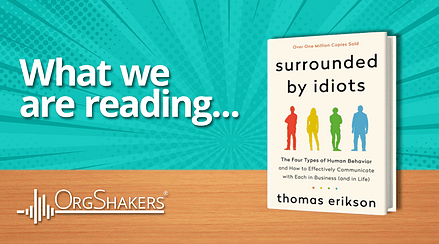Menu

Time to Say Goodbye to 9-to-5?
Reid Hoffman, co-founder of popular social media platform LinkedIn, recently made the prediction that by 2034, the 9-to-5 job will be extinct.
Hoffman is famed for his grand predictions; most notably, he predicted the mass rise of social media back in 1997 – something which has definitely come to fruition. Now, as we see the world of work continuously change and evolve as it keeps in pace with new generations of workers, new technological advancements, and the rise of the 4-day work week, it’s not such a jump to consider that Henry Ford’s 9-to-5 model – which came into practice in the early 1900s – might be on its way out.
To get a better idea, we asked the OrgShakers team whether they think Reid Hoffman’s prediction is accurate, and if so, what they believe the 9-to-5 will be replaced with:
- David Fairhurst – I agree with Hoffman’s prediction of the 9-to-5 becoming extinct, as it lines up perfectly with my own predicted that HR professionals and businesses need to be preparing for the end of jobs altogether. The ‘job’ – defined as a set of responsibilities assigned to an individual employee – has been the fundamental building block of organizations for millennia.
However, we have seen that the pace of this organizational change has been rapidly accelerated by the influx of new technologies paired with the evaporation of the boundaries of time and geography. Therefore, I believe that a more flexible and responsive methodology is needed in order to keep up with this new pace of change through companies increasingly adopting a skills-based approach to managing work and workers.
- Therese Procter – With the rise of the gig economy, remote work, and automation, more people are going to choose to work on their own terms, selecting projects and clients that align with their skills and interests. AI and automation will likely free humans from mundane and repetitive tasks, paving the way for more creative and high-value work. This shift could lead to a fundamental change in how we approach work, possibly making the traditional 9-to-5 schedule redundant. So, I agree with the prediction, however, it’s essential to note that this prediction might not apply universally. Certain industries, such as healthcare, education, and retail, will still require more traditional schedules.
As we move forward, it’s crucial for individuals, companies, and governments to adapt to these changes and create new systems that support this evolving workforce. This might involve rethinking education, training, and social safety nets to ensure that everyone can thrive in this new environment.
- Clare Parkes – I don’t know that 9-5 will be extinct per se, but I do agree that there will be a more significant mix in the workplace of different employment terms. Given, amongst many trends, the shift towards skill-based job design, greater flexibility post-Covid, and a need to refine the non-office-based teams’ terms and conditions towards the increasing consumer demand of 24/7, then it is inevitable that the way we employ people will change, with an increased mix of employment agreements and ways of working as a result.
- Ken Merrit – I agree with the thesis that the 9 to 5 workday will be extinct in the next 20 years. The following 2 trends are driving us to this inevitable outcome:
- Changing of the Guard: As Boomers & Gen X descend and Millennials & Gen Z ascend as business leaders, traditional business model operating rules will change accordingly. I believe that means we will have more open work rules and far fewer rigid structures that were born prior to today’s workforce engagement preferences and the digital age.
- Future of Virtual Work: More technology and broader geographies have already ushered in more virtual work through Zoom, Teams, etc. Businesses, Education, and Not-for-Profit models are all getting more comfortable with working across time zones and timelines. As tools like Augmented Reality and Virtual Reality become more adopted, it will enable even more flexibility for the future of work.
- Cindy Strong – According to Reid Hoffman the traditional 9-5 will become a thing of the past, claiming AI and the gig economy will continue to be disruptors and change agents in the way work is done. Although the key contributors he outlines are already being felt by the modern workforce, I don’t agree it is likely all traditional ways of working will be extinct. Rather we will require new skills to adapt to the advances in technology and flexibility in the way work is done. It is not a new experience for technology, inventions and world events to be a catalyst to require a workforce to be resilient to change. The encouragement is we have insights from leaders like Mr. Hoffman to prepare our resilience on the horizon of uncertainty.
- Sayid Hussein – I agree with Reid Hoffman’s prediction that the traditional 9-to-5 job could be extinct by 2034. The rise of remote work, flexible schedules, and the gig economy have already begun to shift the workforce away from rigid time structures. In place of the 9-to-5, I believe we will see a more fluid work environment where individuals manage their own hours, driven by project-based work or outcomes rather than clocking in and out at specific times. This change will be fuelled by advances in technology, such as AI and automation, which will enable people to work from anywhere at any time, making the concept of a fixed workday increasingly obsolete.
- Anju Jain – I agree with Reid Hoffman’s prediction that the 9-to-5 job could become obsolete by 2034, largely driven by the ongoing transformation in how we work. The acceleration of remote work, advancements in automation, blurring geographies, seeking skills vs degrees, and the rise of the gig economy are already challenging the traditional workday structure. In this evolving situation, work is likely to become more fluid and project-based, with a focus on results rather than hours logged. We may see a model where employees have the freedom to choose their work, working hours, and locations, thereby increasing their productivity and work-life balance. Individuals are likely to quickly shift between being an employee, freelancer or an entrepreneur.
However, this shift would also require substantial changes in labor policies, employee benefits, and management practices. Companies will need to rethink how they hire, measure performance, or compensate people. Traditional models of health insurance and retirement plans will have to be redefined. The challenge will be to balance the benefits of this new work structure with the potential risks of increased worker isolation and burnout – a significant concern for the individual, the organization, and society as a whole.
If you would like to discuss any of these topics in greater detail, you can get in touch directly through our website, or book in a private and confidential one-hour consultation with one of our team members through our OrgShakers CL!CK service.



